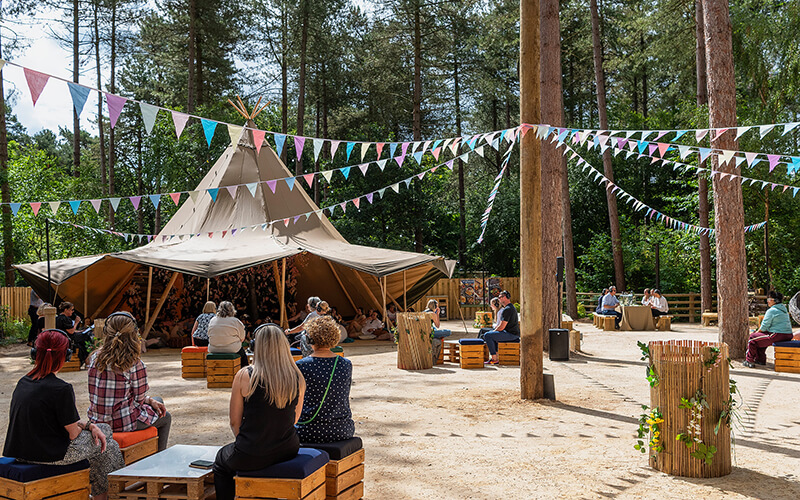Julia Green, head of corporate events at Center Parcs Conferences & Events shares her insights on the use of AI in the world of events:
Corporate culture has radically changed in the past few years, from the rise of the four-day work week and recent discussions around a ‘right to disconnect’, to ChatGPT becoming firmly established within the employee toolbox. It’s not surprising that workplace etiquette has a significant trickle-down effect on the world of corporate events, but the exact way this influence manifests itself is harder to predict. As we look towards 2025 and beyond, here are my predictions for which trends will continue to shape the events industry.
- Catering to dwindling attention spans & digital-native delegates
You might have read that attention spans are dwindling, with recent research from Kings College London reporting that nearly half of the public feel their capacity for extended periods of concentration has deteriorated. This creates an added challenge for companies when bringing employees together for strategy meetings and workshops, and it’s no wonder companies are striving for more engaging presentations.
Helping to combat wandering minds, AV, AR, VR and AI technology have all been at the heart of the most interesting, immersive and impactful events of 2024. VR allows audiences to step into any world whatsoever, meaning presenters can now invite guests to don their VR headsets and take part in life-like virtual training sessions or explore a new product in a novel way. Looking ahead, I’m confident the industry will increasingly embrace ‘experiential’ events and immersive technologies to deliver compelling storytelling for live and hybrid audiences, particularly as digital-native Gen Zs make up more and more of the workforce and as we welcome Gen Alphas in five years’ time.
- Navigating conferences and events with mobile apps
Another growing trend in corporate events is the reliance on mobile apps, which now enjoy an average adoption rate of 61%. We’ve seen these types of white labelled event apps really take-off in the festival and music industry, and more recently with trade shows, but this is still a fairly novel concept for corporate retreats and away days. Give it a couple of years though, and I’m sure apps will be an essential add-on to any business-run gathering.
Using apps gives conference attendees access to vital information such as key note speakers, timings and locations, alongside a map of the venue which can be especially helpful for navigating larger events with multiple workshops and activities happening in tandem. These apps unlock a host of interactive features, such as allowing audience members to put questions to speakers and vote on key points and decisions. There’s also an important social media-esque dimension, with news feeds and in-built messaging functionalities helping to bring together employees from all corners of an organisation, who might not usually get a chance to connect.
- Data collection for continued improvements
Against a challenging economic backdrop, companies want to ensure that each penny spent is a penny well spent and are under more pressure to demonstrate ROI for each of their events. Collecting registration and attendance data, session engagement, and post event reflections have naturally become an organic part of any event’s wrap-up process. The trouble with post-event surveys is that response rates are typically quite low and those who take the time to submit feedback have usually forgotten a lot about the day by the time the survey comes around. Plus, the earliest this constructive feedback can be actioned is often not until the next annual party.
In the next five years, however, I can see real-time feedback becoming more mainstream in the conference space – allowing delegates to shape the event they want as it’s taking place. Whether that’s giving participants a chance to feedback on audio quality and background music volume in real-time or taking a vote on the order of events for the day – events are about to become a whole lot more fluid, interactive and democratic.
- Wellness and health
Corporate conferences and company away days have historically been associated with drinking and eating – or in other words: indulgence. But a broader focus on employee well-being in the workplace is driving a push for conferences and events that have wellness and health at their very core.
Mindfulness retreats, yoga sessions and other holistic wellness activities have become central to many of the big corporations’ employee benefits strategy and events programme. Responding to growing demand, we launched a Twilight Spa Package for corporate clients this year, which gives businesses exclusive access to our award-winning Aqua Sana Forest spa, including expert sleep sessions to help delegates unwind and relax.
- Making sustainability values visible
Finally, sustainability is at the forefront of all large corporations’ event planning agendas, demonstrated emphatically at the Paris Olympics, which aimed to reduce emissions in line with the Paris Agreement and set a new precedent for the future of large-scale events.
A 2024 survey from Eventbrite found that 61% of event planners are taking measures to make sure their events are sustainable. For corporate events, this starts with choosing a venue with strong eco-credentials, but also extends to relying on locally sourced catering options, using recyclable materials like compostable cups, opting for low-carbon activities such as bike riding, and waving goodbye to the usual deluge of tote bags, paper pads, and pens.















